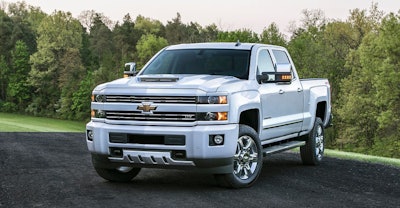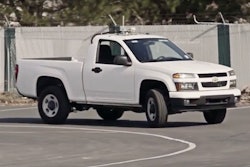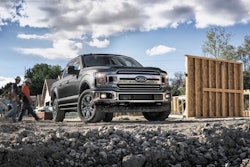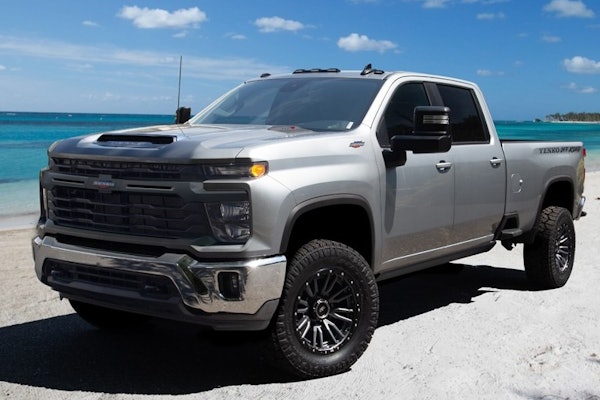 2017 Chevy Silverado
2017 Chevy SilveradoGM full-size pickups topped J.D. Power’s U.S. Initial Quality Study (IQS) by having the fewest owner-reported issues within the first 90 days of new vehicle ownership.
The study, which was released today, placed the 2017 Chevrolet Silverado and Silverado HD at the top of the full-size light and heavy-duty pickup categories respectively. This marks the third consecutive year for Silverado and second consecutive year for Silverado HD.
The 2017 Chevrolet Colorado and 2017 GMC Canyon placed second and fourth respectively among mid-size pickups in the annual study. The top award went to Nissan’s 2017 Frontier.
GM’s winning streak continued with the prestigious J.D. Power Gold Plant Quality Award for its Fort Wayne Truck Assembly Plant, which was recognized as delivering the highest-ranked automotive manufacturing quality in the Americas in 2017. The Silverado, Silverado HD and GMC Sierra and Sierra HD are produced at Fort Wayne Assembly.
“Our team builds the most exceptional full-size trucks in the business, assembling each vehicle as if it were our very own,” said Michael Thomas, Fort Wayne Assembly plant manager. “The men and women at Fort Wayne Assembly put the customer at the center of everything they do. Our customers can be assured that they have invested in a truck that will both delight and safely transport them and their loved ones for years.”
The 2017 IQS midsize pickup ratings from highest to lowest are Nissan Frontier, Chevrolet Colorado, Honda Ridgeline, GMC Canyon and Toyota Tacoma. (Click here to see all mid-size truck ratings.)
The 2017 IQS large light-duty pickup ratings from highest to lowest are Silverado, Ram 1500, Toyota Tundra, Ford F-150, GMC Sierra and Nissan Titan. (Click here to see all full-size light-duty truck ratings.)
The 2017 IQS large heavy-duty pickup ratings from highest to lowest are Silverado HD, Ford Super Duty, Ram 2500/3500, and GMC Sierra HD. (Click here to see all full-size heavy-duty pickup ratings).
Ford reported that it jumped to No. 2 of all non-premium brands in J.D. Power’s 2017 Initial Quality Study – the brand’s best-ever ranking in the annual study now in its 31st year.
The Ford brand improved to 86 problems per 100 vehicles from 102 in 2016. This improvement helped Ford tie for fourth among all brands from 11th in 2016.
Ram Truck is the industry’s most improved truck brand with more than a 24 percent improvement in the brand’s initial quality score from last year’s study.
Overall, FCA US improved its initial quality at a faster rate than the industry average. This is the second consecutive year that FCA US has improved in initial quality at a faster rate than the industry average.
“We’re pleased to see that all FCA US brands have made improvements in initial quality, especially Ram Truck with its big step up this year,” said Scott Garberding, head of quality, FCA Global. “My colleagues and I are focused on continuing to deliver quality new vehicles, like the all-new 2017 Chrysler Pacifica, as we continue to bring important new technologies into the market with an increasing number of exciting new vehicle launches in the coming years.”
Four FCA US vehicles placed in the top three of their respective segments for initial quality.
IQS is based on responses from nearly 80,000 purchasers and lessees of new 2017 model-year vehicles surveyed after 90 days of ownership. The study asks customers to identify issues with their vehicles’ design, as well as defects.
Audio/communication/entertainment/navigation (ACEN) remains the area where new-vehicle owners experience the most problems. However, this category shows the most improvement since 2016 with a score of 22.8 reported problems per (PP) 100 vehicles, or 2.7 PP100 better than last year.
The only category to worsen this year is features, controls and displays, which are considered precursors to autonomous technology. The largest increases in problems are for cruise control (primarily adaptive cruise); lane departure warning; collision avoidance/alert systems; and blind spot warning.
“These features comprise some of the building blocks of autonomous vehicles, and an increasing number of consumer-reported problems sounds warning bells for automakers and suppliers,” J.D. Power stated in a press release. “Consumers will need to be convinced that these systems are foolproof before they will give up driving control to autonomous vehicles.”










